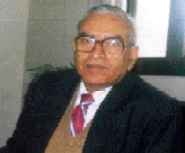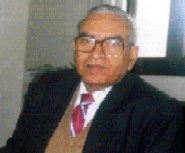
Teachers’ Teacher, Dr. Damodar Thakur talks to the Yemen Times: “In life, it is not money or the position that matters so much as the satisfaction, the happiness, the emotional enrichment that makes you genuinely happy.” [Archives:1999/41/Interview]
October 11 1999

YT: Dr. Thakur, you have been associated with the Yemeni educational system for a long time. Could you please tell us what you were in India before coming to Yemen and how you came here.
DT: I came to Yemen in 1981. In 1980 I was invited to give a few lectures.That is how I initially came to Yemen.Dr.Zandani who was the Rector at that time,after the first lecture took liking for me and wanted me to continue as a regular faculty of the Sanaa University.
Before I came here I was the Director of the Central Institute of English and Foreign Languages, Regional Center, Lucknow. The main job of that center was to provide in-service training to college and university teachers. I was the Director of that institution and responsible for teaching and directing those courses.
YT: What was the state of education in Yemen at the time you came, particularly with regard to the teaching of English ?How does it contrast with the present situation?
DT: Well, at that time education was in its initial stages. During those days, the study of English for students was an excitement; now it is an opportunity. At that time it was a kind of intellectual curiosity. Now it is a road leading to jobs. So the students’ attitudes have now changed. Moreover, at that time the students used to be very small in number. When the first group of students joined , there were only three or four students. Your late chief editor Mr. Abdul Aziz was one of the students of our department. There were only four students in one group, but now this year, for example, we have something like 600 students wanting admission in our department, out of which we can select a maximum of 100. So, English teaching has become more popular. It is more in demand. More and more pupils want to study English. At that time, only those who had a very high level of motivation, and a very high level of ability in English joined our department. But now with the spread of education, there is a much larger number. And there is a range of abilities. There are,for example, brilliant ones, there are the average ones, we have also students whose ability is not that high. So there is a great deal of difference.
YT: In your perception how has the English teaching scenario changed in Yemen over the years and what are the reasons?
DT: English teaching, I don’t think has changed for the worse over the past few years. The curriculum has,of course, been revised. Teachers have come and gone, but we have learnt out of experience. We have been trying to make the teaching of English more meaningful, more job-oriented. So there is a change in quality. There is a change in direction. There is a change in attitude, that way. At that time, it was just, as I said, an intellectual discipline. People were not worried for jobs as they are now. So to make it more job-oriented now, it is more need oriented these days than it used to be at that time.
YT: As an expert in education and given your long acquittance with the Yemeni students, what do you think are the striking features of the Yemeni students?
DT: Well.The striking features of the Yemeni students in my perception are the following: they are very warm-hearted; they are genuine people and very eager to learn .This is one of the reasons why I have stayed here for such a long time. I have spent the best and the most creative years of my life here. It is because of my students. There are exceptions,of course; but ,by and large, the Yemeni students are really ideal students. They have a sincere desire to learn.They are hard working,and respectful towards their teachers. These are some of the qualities which make them very different from students in certain other parts of the world.
YT: Some people say that education in Yemen is deteriorating. The competence of the students is not as it was in the past. What are the reasons behind the deterioration of the educational system in Yemen in your view?
DT: First of all, I won’t entirely agree that the standards are going down. This is true to some extent, no doubt. But this is not always true . The partial deterioration is because of the large number of enrollment. You know, more and more students are coming to the university and we haven’t got the infrastructure for that. We need a large number of rooms, we need a large number of teachers, we need audio visual aids. So the materials,and the infrastructure that we need to cope with the increasing number of students are not adequate. The number of students tends to surpass the existing infrastructure that we need for being able to provide quality education for them.
YT: We have heard that you were offered lucrative political positions like ambassador to Yemen, but you preferred to stay as a professor at the university. Why?
DT: I like Yemen because of the students and my colleagues. I really like my Yemeni colleagues and my Yemeni students. You see, once, one of my students asked me: are you more of a teacher or more of a father? My answer was: “Every teacher has a father in him and every father has a teacher in him. The greater the father in the teacher, the greater the teacher he is likely to be.” Now my students are not just names and role numbers for me. They are not just faces, they are like my children. If a student is in trouble, I get the impression that my own child is in trouble, I must do something about him. I have developed a sense of identity with them and most of the students ,too,have developed a sense of identity with me. I am not just a father like figure to them, many of them consider me to be their father. That is the kind of emotional bond between my students and me which is highly satisfying for me. If I went to a country like Emirates or Saudi Arabia, I would have got much more money, but I wouldn’t have got the sense of fulfillment that I am getting here. After all, in life, it is not money or position that matters so much as the satisfaction, the happiness, the emotional enrichment that makes you genuinely happy. I have never starved for fame or fortune. I am very rich that way, rich in the sense that I am surrounded by students who respect me. And on my part, I like my students.
YT: What would be your message to improve the standards of the Yemeni students in English?
DT: Two messages.The first one is: “Genius is 99% perspiration and only 1% inspiration.” That is, it is only hard work that can get them success. The second message is associated with the statement of Gabrielle in the Holy Quran: “Ikra” and I want to apply it in a different manner:” Read and read, that is the only salvation. That is the only thing which can take us out of ignorance”. In my opinion, the best thing we can do is to make the students read and read. If we can create and develop in them a passionate love for reading, and provide healthy enjoyable materials to them, we will have done a great deal of our job.
YT: Would you like to add anything?
DT: You see, the only thing I would like to add is a line from the Holy Quran. This is what I say to my teachers, my colleagues:”Idf’a billati hiya ahsan”, that is: “Repel the bad by the good.” If the students are making mistakes, don’t keep telling them they are making mistakes. Give them excellent examples of writing and make them read it. Give them excellent examples of students. Don’t tell them that they are bad. I like the examples of excellent students. That is the only thing I would like to say. So “Ikra” and then ” Idf’a billati hiya ahsan.” That is my message.
——
[archive-e:41-v:1999-y:1999-d:1999-10-11-p:./1999/iss41/intrview.htm]


